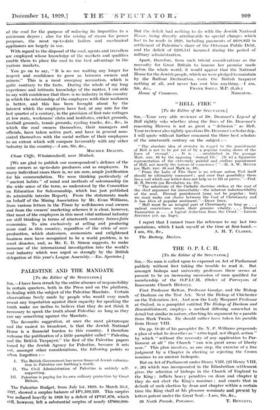"HELL FIRE "
[To the Editor of the SPECTATOR.] SIR,—Your very able reviewer of Dr. Dearmer's Legend of Hell rightly asks whether along the lines of Dr. Dearmer's reasoning Heaven is not as great a delusion " as Hell. Your reviewer also rightly questions Dr. Dearmer's scholarship.
I will quote without further comment the three best scholars of the nineteenth century on the subject :-
" The absolute idea of eternity in regard to the punishment of Hell is not to be got rid of by a popular toning down of the force of ' eternal.' . . . It is . . . established in the passage Matt. xxv. 46 by the opposing ' eternal life.' [It, is] a figurative representation of the extremely painful and endless punishment of Hell, not merely the terrors of conscience ! "—H. A. W. MEYER (on Matt,. xxv. 46 and Mark ix. 48).
" From the Lake of Fire there is no release unless Evil itself should be ultimately consumed ; and over that possibility there lies a veil which our writer does not help us to lift or pierce."—Prof. H. B. SWETE (on Revelation xx. 10).
" The substitute of the Catholic doctrine strikes at the root of the chief argument for immortality—the inherent indestructibility of the soul. Eternal punishment [may not be popular ; but] we must make our choice between the God of Christianity and le bon Dieu of popular sentiment."—DEAN INGE.
" Hell must be an integral part of Christianity so long as . . . radical convictions retain their genuine vitality.. . . Eternal Damnation is . . . a logical deduction from the Creed."—LESLIE STEPHEN (cit. ap. Inge).
I regret that I cannot trace the reference to my last two quotations, which I took myself at the time at first-hand.—












































 Previous page
Previous page